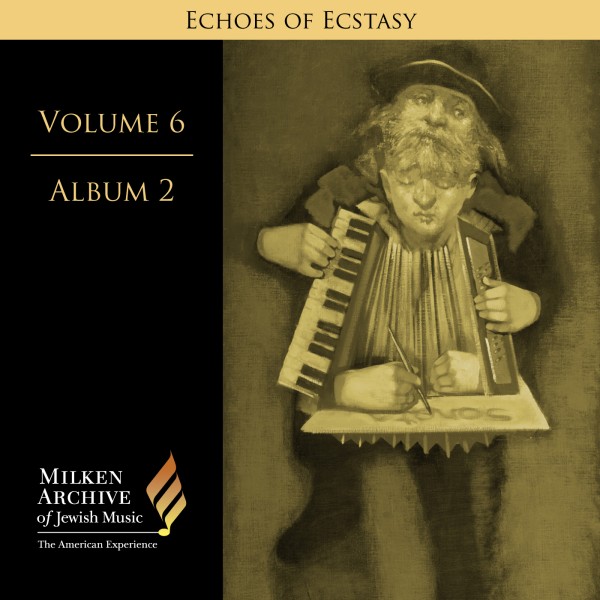Tracks
Track |
Time |
Play |
| Demon's Welcome | 01:14 | |
| Home Variations | 03:21 | |
| Wedding Dances | 04:38 | |
| Reading The K'tuba | 02:09 | |
| Incantation | 02:53 | |
| Asmodeus' Court | 01:17 | |
| Invocation of the Jew of Babylon | 00:36 | |
| The Jew of Babylon Appears | 00:41 | |
| Processional: The Jew of Babylon's Mystic Circle | 01:23 | |
| Yenta's Fantasy: Trying on Her Wedding Dress | 00:47 | |
| Yenta's Fantasy: The Wedding Celebration | 03:21 | |
| Flight | 01:43 | |
| March - Wolf and Sheep | 01:58 |
Liner Notes
Suite from the incidental music for the play by Isaac Bashevis Singer
Isaac Bashevis Singer (1904–91) is widely considered one of the great writers of Yiddish fiction in the modern era. Certainly he is the most famous Yiddish writer to the non-Yiddish-speaking public in America, owing at least in part to his receipt of the Nobel Prize in literature in 1978, which marked the first—and to date the only—instance of that award given to a Yiddish writer. Singer’s initial perception of the theater was negative, as he was taught to associate it with a venue for evil and decadence. His father, an eastern European rabbi, is said to have described it as a place where “the wicked sit day and night, eat forbidden [nonkosher] food, and sin with loose women.” Of course, piously orthodox and self-cloistered Jewry of that ilk and era had no monopoly throughout history on such views of the theater as dangerous to religious and moral values. In the West, the Puritans in 17th-century England provide but one classic example, and even at the beginning of the 21st century, similar attitudes prevail among certain nominally Christian fringe sects and among various fundamentalist divisions of non-Western religions—as well as among some extremely devout circles within Jewish orthodoxy and the Hassidic world. In any case, inasmuch as the theater had been demonized for Singer, it is interesting to observe that The Mirror—his first theatrical stage adaptation from one of his short stories (of the same title)—concerns a demon’s seduction of a vulnerable woman.
The Mirror, first published in its English translation in 1955, is one of a number of demon-driven stories that Singer wrote originally for a projected volume, Memoirs of the Spirit of Evil. The story and the play tell a tale of a bored, frustrated wife who, while gazing at her naked image in the mirror, is seduced into darker realms by a demon. The New York Times review at the time called it “an erotic and moral fable dramatizing...the dangers of fulfilling daydreams.” The demon’s function in the play differs somewhat from that in the short story, where he is the first-person narrator. In an overview analysis, Sarah Blacher Cohen observed the following about the demon in the story: “As a witty teller of the tale who seems more like a ‘Puckish’ wedding jester than a grim fiend, he causes us to take a light-hearted view of Zirel, the faithful but bored shtetl woman who succumbs to temptation.”
The play concerns themes frequently addressed by Singer: religious life among small-town Jewry in eastern Europe; the sexual frustrations often produced by communally and religiously institutionalized sexual repressions and inhibitions; and the road to fantasy from those frustrations, which could lead to mystical and even satanic alliances with demons and with evil. Yehudi Wyner’s musical conception for this work was informed by his own understanding and interpretation of Singer’s preoccupation with exposing a consciousness of sexuality within that enclosed pious world—something not so transparent previously in major Yiddish fiction, nor emphasized outwardly in folklore.
Wyner’s involvement with this project began in 1972, when he was asked to provide incidental music for the Yale Repertory Theatre’s production of the play. He has provided the following comments:
From the very first reading, I found myself enthralled by the style and subject matter of the play, and I accepted the invitation with enthusiasm. The music was written rapidly over the winter recess period in 1972–73, in order to meet the deadline for the opening in January 1973.
The play deals overall with eastern European Jewish village or small-town life. But the real subject is sexual repression and fantasy vis-à-vis orthodoxy and superstition. From the standpoint of religious orthodoxy, or even the folk norms of the time, the play is highly subversive.
For the music, I drew upon my longtime exposure to the various musics of Jewish traditions—from secular folk and religious song to the music of klezmer bands; from the monophonic modes of the Near East to music of the Sephardi Jews of the Mediterranean basin. And just as Singer often used parody and distortion to reveal a contemporary point of view about conventional practices and modes of thought, so I utilized musical parody and stylistic distortion to achieve a similar result. The overall style, however, maintains a basic conventional attitude, allowing departures from the conventions to speak more forcefully.
The instrumental ensemble was conceived so as to simulate an eastern European klezmer band. It provided live performances throughout the run of the play, and was stationed on a balcony above stage left. In writing the music, it somehow took over in many ways: there is a great deal more music than was really needed for advancing certain scenes. But the director, Michael Posnick, found a way to include nearly all of it in the production by creating interludes and transitions to accommodate it.
As a play, The Mirror suffered from too many structural weaknesses to be successful. The fine first act was followed by a somewhat loose second act, and the play concluded with a fatally careless third act. When Posnick approached Singer to suggest some rewriting because that third act just didn’t work, Singer replied, “You have hypnotized yourself into thinking that it doesn’t work.”
It is problematic to characterize the music for The Mirror as a suite. Some parts do organize into a coherent succession of numbers. For example, the opening salvo of noisy demons’ welcome is followed by a short set of quiet variations that are meant to suggest a nostalgic yearning for home—both physical and spiritual. This music gives way to a group of wedding dances, at the end of which there is music to accompany the reading of the k’tuba (the marriage contract). The banality of this k’tuba music is intentionally ironic: the ceremony is a “black wedding”—as if a wedding “in hell.”
Following that, the individual numbers reveal their “incidental” function: short ceremonial processions for the Jew of Babylon; “potted palm” music for Asmodeus’ court; and a tender song and a vulgar dance for Yenta’s imaginary wedding. The music for flight is mysterious and fugitive: the flight is an attempt to escape from the self.
“Wolf and Sheep,” with the text by Singer, is an embittered anthem condemning hatred and hypocrisy whenever it is found, whether practiced by Jews or non-Jews. It is clearly Singer’s outcry against prejudice, superstition, and injustice.
From the incidental music, Wyner subsequently fashioned a self-contained work performable on its own—“functionally after the manner of Stravinsky’s L’Histoire de Soldat,” he described, “but without narration.”
Lyrics
Text based on the play The Mirror
INCANTATION
(SPOKEN):
Swift is the wind,
Deep is the ditch.
Come black cat,
Come within reach.
Strong is the lion,
Mute is the fish.
Reach from your silence
And take your dish.
And when Ketev Mariri heard this spell, he came riding on a hoop, his hair loose, his nose red as fire. He had a retinue of demons riding after him: one on a stick, one on a hedgehog, and one on a snake. One performed somersaults; another jumped over his own tail. And when Zluchah the witch saw Ketev Mariri, she fell at his feet, crying, “Take me, my love, and do with me as you please!”
YENTA'S FANTASY: THE WEDDING CELEBRATION
(SPOKEN):
Come my beloved. Don’t be shy. Lead me under the canopy.
Play, musicians! Drum, drummer. Blind Berele, let’s hear the trumpet.
Zaynvele, sound the clarinet. Let there be merriment!
(SUNG):
The angels are gay in heaven with the King.
The wild ox will dance and play, and Leviathan will sing, blessing bride and blessing bridegroom.
Bride, bride, cry, I will bring you a glass of wine.
Bride, bride, laugh, fiery is your lover. yaba, yaba bayom ba ba ba bom mazel tov, yaba, yaba, fiery is your lover.
The angels are gay in heaven with the King.
The wild ox will dance and play, and Leviathan will sing, blessing bride and blessing bridegroom...
Happy bride, prepare, prepare, let the ritual bath be run.
Happy bride, prepare, cut off your hair.
For the time is near, for the time is near, yaba, yaba yom-b-b-bom.
Blessing bride and bridegroom...undressing bride and...come good khosndal [bridegroom], we will lead you to a darkened room—a sweet secret will be revealed...
MARCH: WOLF AND SHEEP
Wolf and sheep, both are doomed. Whatever you sow; you reap murder. Live by law, it’s the law of the land. Whatever you say, you reap murder. Your wife is a harlot, your son is a rogue, a thief is your brother, your daughter’s a whore. Gentile or Jew, whatever you preach, what you mean [is] Might is Right. Escape, escape, escape, escape from the field of blood and the swamp of rape. Escape, escape to hide in a ditch behind the wall. Be silent like a mouse. Close your eyes and hold your breath and hope to be saved by the God of Death.
Credits
Composer: Yehudi WynerPerformers: James Guttmann, Double Bass; Judi Kirchner, Mezzo-soprano; Matthew Kirchner, Tenor; Richard Lalli, Baritone; Carol Meyer, Soprano; Robert Schulz, Percussion; Daniel Stepner, Violin; Richard Stoltzman, Clarinet; Yehudi Wyner, Speaker
Publisher: Associated Music Publishers, Inc./Schirmer


